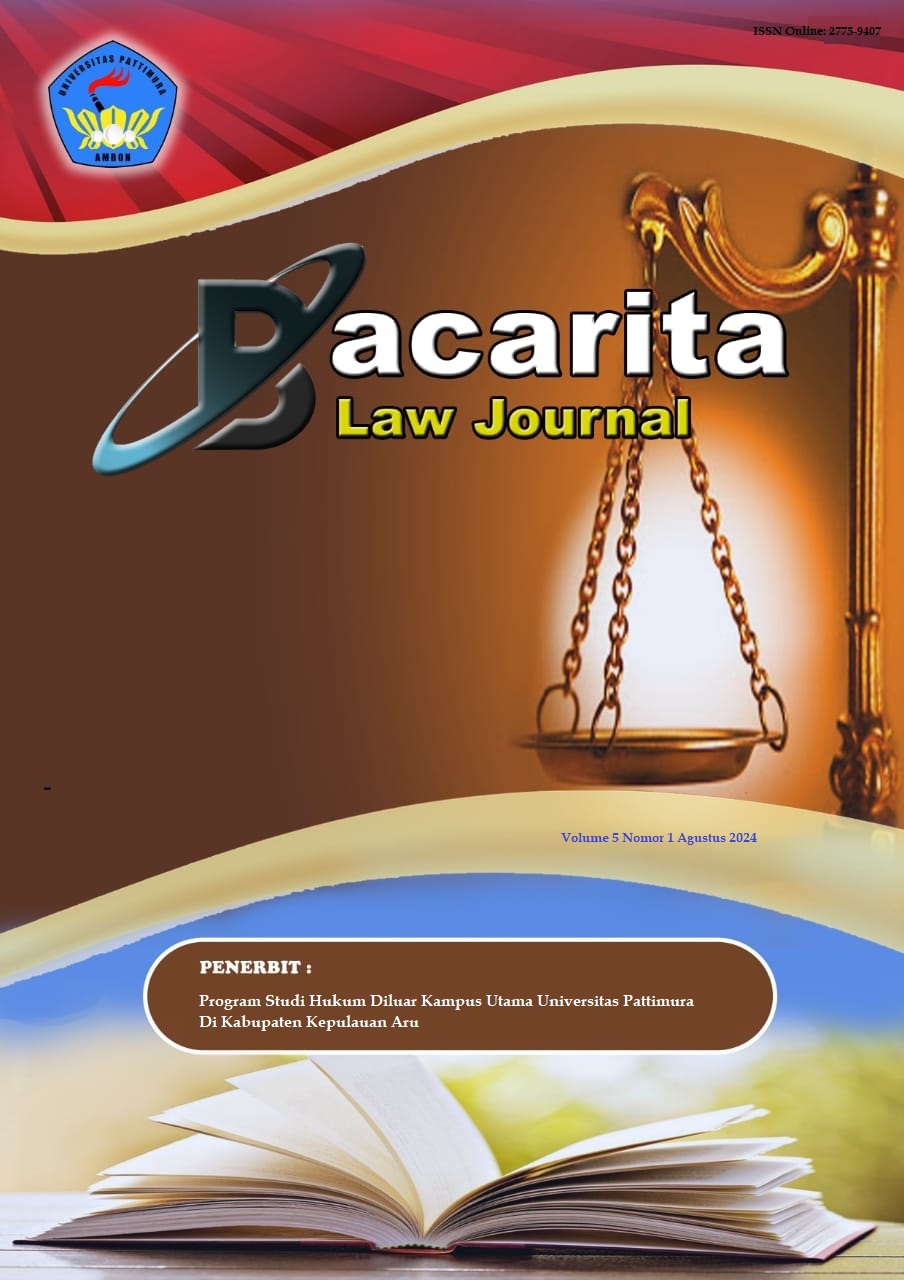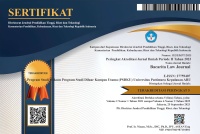Family Problems in Marriage Law
Abstract
Marriage is a legal bond regulated in Law Number 1 of 1974 concerning Marriage, which aims to create a harmonious and prosperous family. However, in practice, divorce still occurs frequently, including in Stabat Religious Court Decision Number 1113/Pdt.G/2023/PA.Stb. The main problem in this study is how the regulation of marriage law in Indonesia regulates divorce and the main factors that cause divorce in these cases. This research aims to analyze the regulation of divorce in Indonesia and identify the main causes of divorce based on a case study at the Stabat Religious Court. The research method used is normative juridical, with a legislative approach and case studies of court decisions. The results showed that divorce in Indonesia must go through the courts in accordance with Article 39 of the Marriage Law, with reasons regulated in Government Regulation No. 9 of 1975, such as prolonged disputes and domestic violence. In the case of the Stabat Religious Court Decision, the main factors for divorce are disharmony, unresolved arguments, and differences in principles that cause the relationship between husband and wife to be untenable. In conclusion, divorce is the last resort in resolving household conflicts that can no longer be saved. Therefore, there is a need for more effective mediation efforts and legal education to married couples so that they can understand the legal consequences of divorce before filing it with the court.
Downloads
References
Abdullah, M. “Maqashid Syariah Dalam Putusan Hakim Pengadilan Agama.” Jurnal Hukum Islam 10, no. 2 (n.d.): 98–115.
Aisyah, Nur. “Peranan Hakim Pengadilan Agama Dalam Penerapan Hukum Islam Di Indonesia.” Jurnal Al-Qadau: Peradilan Dan Hukum Keluarga Islam 5, no. 1 (2018): 73–92.
Al-Zuhaily, Wahbah. Al-Fiqh Al-Islami Wa Adillatuhu, Juz VII. Vol. 3. Dar Al-Fikr, Damsyiq, 1989.
Azis, Muawanatul, Syahruddin Nawi, and Ilham Abbas. “Efektivitas Penilaian Kesaksian De Auditu Dalam Perkara Perceraian Di Pengadilan Agama.” Journal of Lex Philosophy (JLP) 5, no. 2 (2024): 1918–32.
Cahyani, Tinuk Dwi. Hukum Perkawinan. Vol. 1. UMMPress, 2020.
Diana, Isna, and Anfal Bahri. “Dinamika Pernikahan Dan Perceraian Di Berbagai Negara: Inspirasi Reformasi Hukum Perkawinan Di Indonesia.” Lentera 6, no. 2 (2024): 142–45.
Farah, Naila, Musahwi Musahwi, and Muhamad Ridho Hidayatullah. “Kekerasan Berbasis Gender Dalam Kasus Perceraian Pada Masa Pandemi Covid-19 Di Kabupaten Cirebon.” Yinyang: Jurnal Studi Islam Gender Dan Anak 18, no. 2 (2023): 177–96.
Fatimah. Peran Hakim Dalam Perkara Perceraian. Yagyakarta: Yogyakarta: UII Press, 2020, 2020.
Fitrianto, B., Dkk. “Kebijakan Hukum Dalam Melindungi Perempuan Dari Perzinaan Dan Problematika Nikah Sirri.” Jurnal Hukum Islam 15, no. 1 (2021): 55–70.
Galih, Muhammad Damar, Dzulfikar Rodafi, and Khoirul Asfiyak. “Efektifitas Proses Mediasi Dalam Mengurangi Perkara Perceraian (Studi Kasus Di Pengadilan Agama Blitar).” Jurnal Hikmatina 6, no. 2 (2024): 348–56.
Indonesia, Mahkamah Agung Republik. “Putusan Pengadilan Agama Stabat Nomor 1113/Pdt.G/2023/PA.Stb.” Stabat, 2023.
Indonesia, Pemerintah Pusat. Instruksi Presiden (Inpres) Nomor 1 Tahun 1991 Penyebarluasan Kompilasi Hukum Islam (1991).
———. Peraturan Pemerintah (PP) No. 9 Tahun 1975 Pelaksanaan Undang-Undang Nomor 1 Tahun 1974 Tentang Perkawinan (1975).
———. Undang-undang Dasar (UUD) Tahun 1945 dan Amandemen Nomor - UUD 1945 dan Amandemen (1945).
Lundeto, Fitriani. “Efektifitas Relaas Panggilan Dalam Penyelesaian Perkara Perceraian Di Pengadilan Agama Bitung.” I’tisham: Journal of Islamic Law and Economics 1, no. 2 (2021).
Mahmud Marzuki, Peter. “Penelitian Hukum.” Jakarta: Kencana Prenada Media 55 (2005).
Nurhadi. Proses Peradilan Perceraian Di Indonesia. Bandung: Bandung: CV Pustaka Setia, 2019.
Nurhadi, M. “Faktor Perceraian Dalam Putusan Pengadilan Agama.” Jurnal Hukum Islam 12, no. 1 (2019): 89-102.
Otih, R. “Kekerasan Dalam Rumah Tangga Dan Konsekuensi Hukumnya.” Jurnal Kriminologi Islam 7, no. 3 (2019): 112-128.
Pakarti, Muhammad Husni Abdulah, Diana Farid, Iffah Fathiah, and Kemal Al Kautsar Mabruri. “Perlindungan Hak Anak Dalam Perceraian Menurut Hukum Keluarga Islam.” Usroh: Jurnal Hukum Keluarga Islam 7, no. 2 (2023): 14–36.
Pemerintah Pusat, Indonesia. Undang-undang (UU) No. 1 Tahun 1974 Perkawinan (1974). https://peraturan.bpk.go.id/Details/47406/uu-no-1-tahun-1974.
Pemrintah Pusat, Indonesia. Undang-Undang Republik Indonesia Nomor 3 Tahun 2006 Tentang Perubahan Atas Undang-Undang Nomor 7 Tahun 1989 Tentang Peradilan Agama (2006).
Rahman, M. “Konsep Pernikahan Dalam Hukum Islam.” Jurnal Studi Islam 8, no. 1 (2020): 21–35.
Siregar, A. dan Wahyuni, R., “. “Faktor Dominan Dalam Gugatan Cerai Di Pengadilan Agama.” Jurnal Hukum Keluarga Islam 12, no. 1 (2021): 45–60.
Suyanto, S H. Metode Penelitian Hukum Pengantar Penelitian Normatif, Empiris Dan Gabungan. Unigres Press, 2023.
Wahyuni, Ajeng Putri, and Arrum Budi Leksono. “Tinjauan Yuridis Gugat Cerai Istri Akibat Perubahan Status Sosial Tenaga Kerja Wanita (Studi Kasus Putusan Nomor: 0217/Pdt. G/2021/Pa. Im).” Jurnal Ilmiah Publika 11, no. 1 (2023): 135–42.
Wahyuni, Indah, Syarifuddin Yusuf, and Erna Magga. “Pengaruh Konsumsi Kopi Terhadap Tekanan Darah Dan Insomnia Pada Mahasiswa Universitas Muhammadiyah ParePare.” Jurnal Ilmiah Manusia Dan Kesehatan 3, no. 3 (2020): 395–402.
Yassir, Muhammad, Abd Muthalib, and Akhmad Husaini. “Analisis Ex Officio Dan Perlindungan Hukum Di Pengadilan Agama (Studi Putusan PA Jember Nomor 1323/Pdt. G/2024/PA. Jr).” Jurnal Al-Fawa’id: Jurnal Agama Dan Bahasa 15, no. 1 (2025): 210–27.
Copyright (c) 2025 Diva Aidilla Fitri, Bambang Fitrianto, Rahman Maulana Siregar

This work is licensed under a Creative Commons Attribution-NonCommercial 4.0 International License.
Authors who publish their manuscripts in this Journal agree to the following conditions:
- The copyright in each article belongs to the author, as well as the right to patent.
- Authors are able to enter into separate, additional contractual arrangements for the non-exclusive distribution of the journal's published version of the work (e.g., post it to an institutional repository or publish it in a book), with an acknowledgment of its initial publication in this journal.
- Authors are permitted and encouraged to post their work online (e.g., in institutional repositories or on their website) prior to and during the submission process, as it can lead to productive exchanges, as well as earlier and greater citation of published work.
- Authors have the right to self-archiving of the article (Author Self-Archiving Policy)















